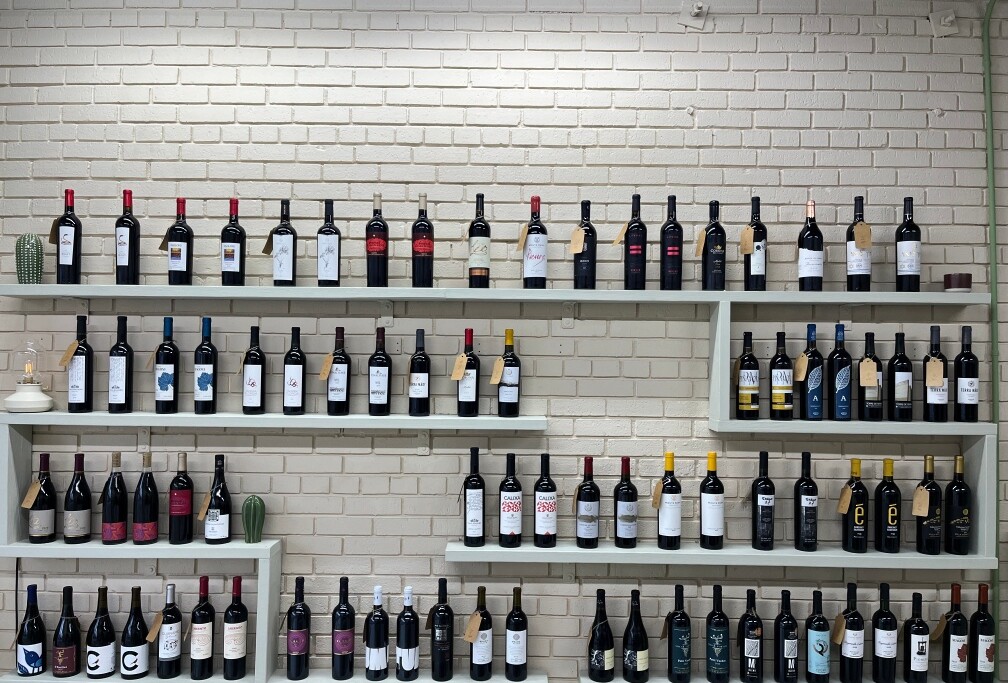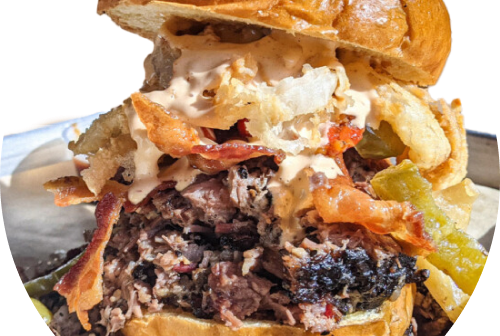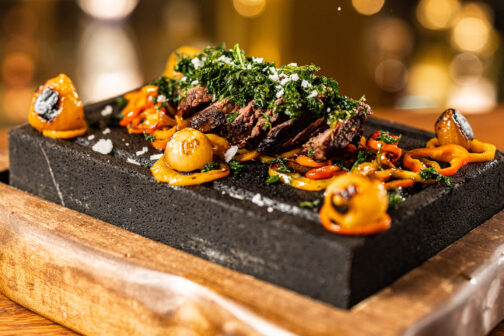Arturo Flores and Eduardo Mendoza didn’t have any mentors, but they’re living out a dream.
In his bottle shop, Vinito, just off Jefferson Boulevard in the heart of Oak Cliff, Flores, 27, knows the gateway to introducing his Mexican oenological elixirs: a natural red wine from Querétaro. It’s from a winemaker known for making terrific Oaxacan mezcal. Querétaro, in central Mexico, boasts a high altitude, which also means good acidity for white and sparkling wines. And the duo has lined their shelves with a gewürztraminer from Querétaro, a sparkling wine from Baja California made from 100 percent barbera grapes (utterly different from the grapes that make up Champagnes, proseccos, and cavas), and an orange wine whose apricot hue is as striking as any from Hungary.
“You can have your light, crisp sauvignon, your buttery chardonnay from malolactic fermentation,” Flores says. “The more I explain this to people, the more comfortable they are.” But this is all relatively new to him, too.
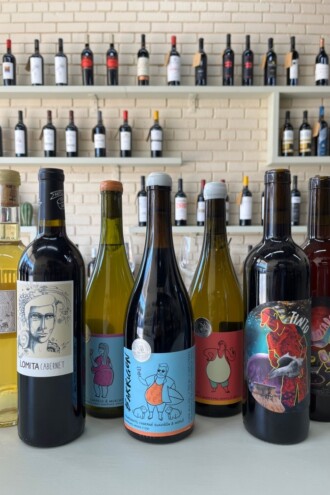
Flores and Mendoza, 30, opened Vinito last October. The textbook for Flores’ first-level Court of Master Sommeliers exam held only one page on Mexican wine, even though the country has the oldest winery in Latin America—Casa Madera was founded in 1597 in Coahuila—while he plowed through 40 pages on Burgundy alone.
Mexico has elevation, a coastal climate, a central valley, and deserts with and without altitude. There is no reason one can’t make red, white, rosé, and sparkling wines—and from varietals that run a gamut from all different origins. The absence of laws restricting blends means that red and white bottles may contain blends you’ve never seen before: a tempranillo (Italian) and cabernet sauvignon (French) from the same vineyard in Chihuahua. Or a viognier (French) and fiano (Italian). Flores swears one sparkling wine betrays not the notes of yeast or sourdough but instead of roasted corn.
What the duo is doing is courageous and pioneering. They’re the only bottle shop they know in the U.S. to sell exclusively Mexican wines. Only two months in, when I first visited with them at length, they’d carried 164 labels, with about 70 labels at any given time (given seasonality and availability). And each label represents effort. When I visited, Flores was in touch with at least one distributor, one importer, and three winemakers a week. He’s building the Rolodex of references. There was nothing before this slowly accumulating little black book.
The two met working in Mexican restaurants. Flores’ mother was in catering, and as the eldest child, he often helped with prep. “I feel like I’ve been in kitchens my whole life,” he says. His parents discouraged him from pursuing the same line of work, and so he graduated from UT-Dallas with a degree in engineering. But he waited tables at Meso Maya as a side job, which is where he met Mendoza, who went from waiting tables to bartending and finally managing. Flores and Mendoza recognized they shared a work ethic. And while Flores moved to Austin for work, the two stayed in touch: when Flores returned to Dallas during the pandemic, they grew closer. Over an Argentinian malbec, Flores says he asked, “Hey, man, is there any of this, but Mexican?”
The answer was yes, but like everything else, it was complicated. It was ironically most cost-effective for importers and distributors to send it mostly to New York and California. Only a few labels were available. And a few labels wouldn’t make a business. “That’s not possible,” Flores knew.
In Austin, Flores polled industry folks in tequila: What do you know about Mexican wine? Is that a possibility in the U.S.? It would require calls and patience. It was a slightly crazy idea. But they were determined. Flores moved back to Dallas and the duo started scouting locations while working full-time jobs. “We learned to take ‘no’ as an answer,” Flores tells me, chuckling wryly.
To enter the tidy shop with its white walls, wine on floating shelves, succulents and cacti, and accents of minty green is to see a vision they worked hard to achieve, doing everything from the accounting to the website design.
When Flores reaches winemakers, they are often surprised. “You really want my wine in the U.S.?” they ask him. Sleuthing, sniffing out, he’s found them through Instagram and other social media; he’s Googled (the few sites he can); he’s fielded texts from his family in Baja California; he’s tumbled down rabbit holes; he’s made cold calls. It’s tricky. Websites are vague. Data is sparse. But they send him bottles, which he tastes with a few friends. If the winemakers can get an importer, he can help find them a distributor, he tells them. And so he does. “Trust me, I can sell it,” he tells them, and so far, the shop’s main clientele is the neighborhood.
They’ve had to overcome prejudice as they’ve become ambassadors for a product not everyone associates with Mexican cuisine. Beer, yes. Tacos, yes. Wine, not so much. Add to that their youth. Given the fact that the Mexican government fails to support the wine industry as it does those of tequila, beer, and even mezcal, Vinito’s tiny, powerhouse team constitutes underdogs championing underdogs.
“There’s a lot of self-doubt,” Flores says.
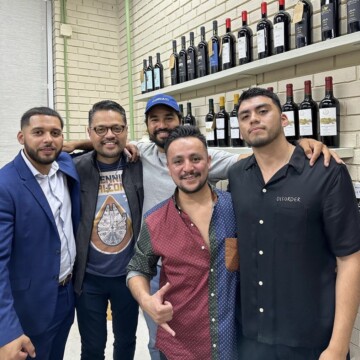
But there’s no doubt when you listen to him speak in hushed tones about the notes he’s discovered in wines from a variety of soil conditions. He finds hibiscus in a sangiovese he pulls off the shelf, chile morita in a grenache. “When you think of a white wine, you never think about avocado,” he says. And yet he finds that, too. “I’ve been eating it my whole life, and I get to taste it in a bottle”—ripe avocado when it’s still mild, but earthy.
Customers gravitate towards two top sellers, which are both reds. “Sparklings have been a surprise for people,” Flores says. As has the fact that absolutely nothing in the shop comes from anywhere but Mexico.
Their next dream would be to open a bar with Mexican food, coffee, and wine.
Over dozens of U.S. trips, the duo encountered a few Mexican wines in restaurant contexts, but no bottle shops. They scoured the country and didn’t find a single thing. “Nothing like this,” Flores says. There’s a reason for that: no one else has done the legwork.
Vinito, 939 W. Jefferson Blvd., Ste. 125.
Author



